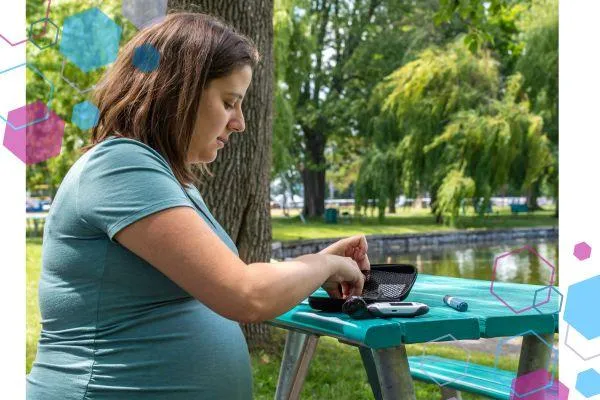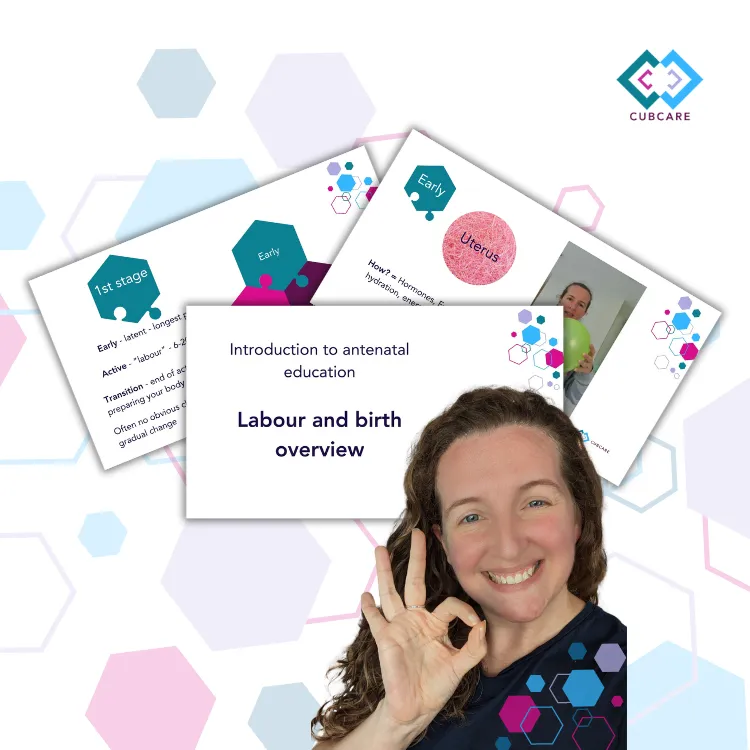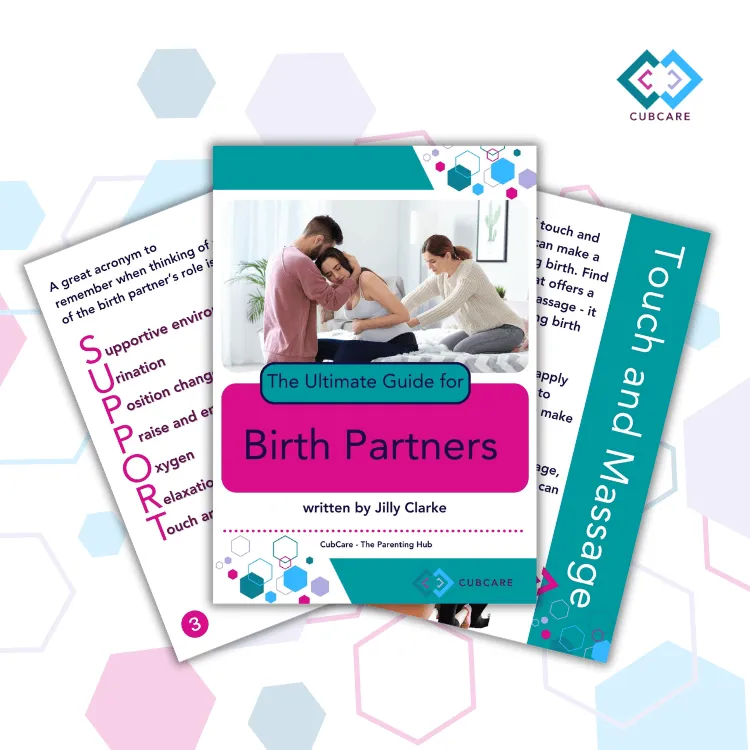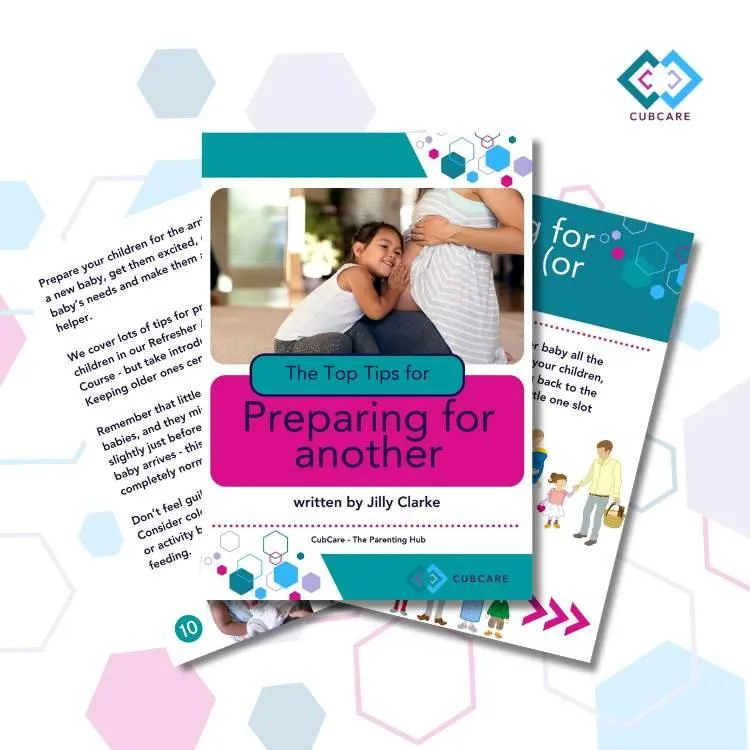We're an award winning Antenatal and Postnatal Education Platform 2025!
(read more here)
CubCare blogs.
From early pregnancy to newborn development.
Advice to help through pregnancy, birth and childhood.
BLOG

Gestational Diabetes - a client pregnancy and birth story
“Having been told I now apparently had Gestational Diabetes (even though my real time sugar levels were fine) involved 4 x a day, every day, blood tests using finger prick testing. I never got a score even close to the upper threshold no matter what I ate. All my scores stayed low the entire time which just exacerbated my feelings that I had to endure this, which I didn’t feel was right, fair or justified.” - Client words
Birth Story Series – Gestational diabetes and how it impacted pregnancy and birth at Lister hospital
Here is a client’s story of our local hospital trust (East and North Hertfordshire NHS Trust – Lister hospital in Stevenage) handling of a routine gestational diabetes test because of a high BMI, and how the resulting in a series of interventions, and a huge amount of pressure that wasn't even justified in her situation.
She attended my Antenatal course when she was expecting her first baby, and you can see so many times throughout the story, that this helped her to have the knowledge and the confidence to stand up for herself and her baby under enormous amounts of pressure. Everything I teach is about understanding the process and listening to the evidence, and your gut, when making decisions.
I want to warn everybody that there is highly emotive topics discussed here, as were discussed in real time with my client. Please use your discretion as to whether this is a suitable read – this story ends well, but if it may be triggering for you to hear the pressure that was applied by medical professionals, then please use caution.
This client has also very kindly spoken about her experience during labour as well. Whilst this might not be the “picture perfect” positive birth story, and one that may be a difficult read in places – it is so important to highlight real life experiences and the impact that having a sound knowledge of the medical system and its pressures.
This situation should have quite possibly been handled very differently by medical professionals. Had somebody taken a client centred approach to the situation and used a more balanced approach then her medical team did, then the lasting impact of the diagnosis may have been different.

Is a gestational diabetes test standard for a high BMI?
"I was given a test for Gestational Diabetes due to my BMI. This is a standard offering and there were no other concerning factors for suggesting gestational diabetes at the time. I agreed to the test, knowing that it was hospital policy at Lister hospital.
However, rather than the standard practise of a fasting blood test, drinking a sugar solution, waiting two hours and then retesting your blood to see how your body has coped with the sugar in real time, I instead just had blood tests. I’m not sure if this is a practise just with our trust at the time (East and North Hertfordshire NHS Trust). I didn’t research into it at the time, but it didn’t seem to be the norm given other people I spoke to.
One sample tested how my blood sugar level was on the day, the other tested my average level over the last 3 months.
The first test came back totally within normal range. The second came back 0.1 point over the normal range (given it was Christmas during the 3-month time frame – whose sugar levels aren’t slightly higher than normal?)
I was told due to the one point result I would be treated as if I had Gestational Diabetes for the rest of my pregnancy. My midwife, and Jilly, did also explain that the acceptable levels had recently been changed (lowered) to capture more people and if I had had my result prior to the recent change, I would have been totally within normal range.
Having been told I now apparently had Gestational Diabetes (even though my real time sugar levels were fine) involved 4 x a day, every day, blood tests using finger prick testing.
This turned my fingers black and blue with bruising, as you must test in the same spot each time. I was left unable to do my job which, was heavily manual given my fingers were so swollen with bruises.
I was assigned a specialist consultant to manage the GD which involved additional hospital trips and I had to record my blood scores after each test to be checked at each visit. I had to carry my testing kit everywhere, including to work, where I had to either test myself in my car or in the toilet to avoid people seeing. Blood isn’t what you want in a work environment! This led me to feeling shame and isolation during what should have been a happy time in my life.
I never got a score even close to the upper threshold no matter what I ate. All my scores stayed low the entire time which just exacerbated my feelings that I had to endure this, which I didn’t feel was right, fair or justified."
A boarderline Gestational Diabetes diagnosis and subsequent pressure from Lister hospital - words from Jilly
(Borderline diagnosis • Gestational Diabetes UK is a great place to consult on gestational diabetes – a diagnosis of GD, whether that close to the threshold or not, should be taken seriously as my client did here – but medical professionals should really take a whole picture of a client and not just look at a paper diagnosis and set limited and conditions for the rest of their pregnancy…as happened here so read on to find out more)
Dr Sara Wickham has some good information on Gestational Diabetes and states on her website about the restrictions placed on many diagnosed:
“as in so many areas of maternity care, the diagnosis, labelling (which can lead to a restriction of options due to perceived risk status) and treatment of gestational diabetes has affected the experiences of hundreds of thousands of women. Around the world there are considerable discrepancies in the assessment, diagnosis, care and treatment offered to women in this area. How can all of this be justified without there being good and clear evidence of benefit?”
Medical pressure to induce for Gestational diabetes
Back to my client's story, "It limited my birthing options, I was told I would only be allowed to give birth on the consultant led ward at Lister hospital, that a water birth was now out of the question (which is what I had wanted) and it also meant the pressure was ramped up to push for an induction.
The induction pressure began at only 38 weeks, including having 3 consultants in one room with us telling us if we didn’t induce that day that we were ‘risking our babies life’. We were also asked, when we explained that we didn’t want to induce this early without any evidence why that was needed, how would we feel when our baby came out stillborn because we didn’t induce that afternoon.
It was highly traumatic, and I was reduced to tears in the appointment just for trying to stick to what I felt was right and not have my baby forcibly ejected early without any evidence this was needed.
We rejected the idea of induction for three more weeks – even though I was subjected to daily calls from the NHS demanding to know WHEN I would be going into for an induction as well as what my plan was – I tried to explain I just wanted to be allowed to give birth when my body and my baby was ready to do so but this was not listened to.
We agreed to go in for daily monitoring from 40 weeks just to appease them, baby was fine every time but the pressure continued as after every hour long testing session they would put me in a room with another consultant who again tried to scare me or push me into induction. The stress of it all led me to taking early maternity leave as I couldn’t work alongside daily hospital trips."

Do I need to be induced with gestational diabetes? - words from Jilly
The NICE guidelines recommend induction of labour or a planned C-Section by 41 weeks for those with Gestational Diabetes with the absence of any other reason to bring baby's birth sooner. Although with this client story you can see that the pressure was really high from 38 weeks despite no other reasons. Her blood levels were always under control, baby and mother were both clinically fine with no concerns.
A Gestational Diabetes induction birth story - delays, bullying and coercion
"After 3 weeks of daily pressure I was broken, and I called them in tears to say I would come in and start the process. I entered the induction ward at 41 weeks, and was naturally already 3cm dilated.
They inserted the pessary which rendered me to tears and screaming in pain trying to get it put in. I was not offered any pain relief even though I had already advised them that I had a high cervix and found smear tests painful in the past so requested pain relief. Highly painful contractions started immediately and came every minute, leaving me unable to move, walk around, even go to the toilet. I was bed bound in pain and even when I asked to have it removed for these reasons, I was told I could not and I just had to ‘see it through’. (This was by a consultant.)
Luckily, a kind midwife saw me crying and came to offer me a hug. She remained me that everything was MY CHOICE and they couldn’t do a thing to me without my consent. I asked her to remove the pessary and she agreed, staying past her shift to make sure it was done. She also gave me gas and air while she removed it so I wasn’t in any pain – something that could have been done easily before, but I was denied.
After ten hours of this pain, it was found nothing had happened and I was still 3cms. Consultant told me that I was now allowed a 6 hour ‘break’ and then they would insert a second pessary. I was finally out of pain and could walk around, talk to my partner, laugh, get the oxytocin and endorphins going again. By the 6-hour check mark, lo and behold I was now 4cms dilated! The magic of being able to exercise and be comfortable and happy!
The next stage was now to break my waters as I had reached 4cms. However due to a lack of staff and no available beds, I was just told I now had to sit and wait.
I couldn’t understand why it was an emergency to get my baby out at 38 weeks but now they didn’t have any beds or staff suddenly it wasn’t an issue and I could sit and wait? Was my baby no longer at any risk? I asked repeatedly if I could go home to wait there instead given there were no beds, I was told I had to stay on hospital grounds and was not allowed to leave.
I ended up waiting 6 days in that bed, nothing happening, while they repeatedly closed the labour ward due to staff shortages and no beds available.
My waters broke naturally at 8am on the Monday morning, I laboured without pain relief (as I was denied any due to not being on labour ward). The midwives refused to check my dilation all day, with the remark, ‘you aren’t in labour if you can still talk – you aren’t in enough pain’.
After my partner had to forcefully demand they check on me at 6pm, I was finally checked and I was fully dilated! I was rushed down to labour ward and within 20 minutes Isabel was born!
The diagnosis meant that post birth Isabel had to be checked for diabetes (no surprise this was negative) and I now have to go every year to be checked for diabetes for the foreseeable as GD can lead to the onset of type 2 diabetes.
So as you can see, it has had a lasting impact on me for the rest of my life."
(you can read more about future diabetes risks after Gestational Diabetes here with this study. Interestingly for client client, with no high values during pregnancy, things look good: Future diabetes risk can be predicted by the number of abnormal oral glucose tolerance test values during pregnancy – Tsur – Diabetes, Obesity and Metabolism – Wiley Online Library)
A happy future
"We have actually just found out we are expecting our second, so due to the diagnosis of GD the first time, I was of course tested super early at 10 weeks – this time however I was given the standard test for GD using the sugar solution and guess what… absolutely normal and no issues! I am now classed as a ‘low risk’ pregnancy (despite still having a high BMI) and the experience so far (as we have just moved to Somerset so a totally new trust) has been worlds apart! So much better so far so I’m feeling positive for a better pregnancy experience this time around.
I am so thankful I got to do your course as it was so educational and informative and I was able to use the breathing techniques to their full given I wasn’t allowed any pain relief my partner used the back massages you showed us on our first parent session too which was a godsend during contractions – I sing your praises to everyone and so does he!
I will be using your teachings again – hopefully this time I will be able to labour at home and set up my safe and happy place."
Words from Jilly - Why getting evidence for "risk" is so important
This poor client had a horrendous, guilt ridden pressure put upon her during the build-up to her birth. The pressure that medical professionals put upon her, when she was clinically ok, and the gestational diabetes diagnosis was completely under control, was incredibly stressful and unfair.
It is so difficult as a person in the system to continue to stand up for yourself in the face of bullying - which is what this poor client had to endure on several occasions.
When being presented with "facts" from medical professionals, it is so important to understand where they got the evidence from - because a lot of the time there is little to no evidence for what they are suggesting.
In the case of the stillbirth threat that this poor family were subjected to, there is no clear evidence to suggest it is true.
This study published in 2022, which combined data from 156 studies and 7,506,061 pregnancies from 1990 to 2021 shows no clear evidence for differences in the odds of stillbirth, neonatal death and many other complications between women with and without gestational diabetes. Gestational diabetes mellitus and adverse pregnancy outcomes: systematic review and meta-analysis | The BMJ
There are many studies highlighting the potential risk factors for Gestational Diabetes – but these should always be used as a guide for your specific situation – in this instance there are many possibilities that could contribute e.g. missed diagnosis, insulin or other drug controlled diabetes, diet controlled .v. no diabetes.
Everybody's situation is completely different - and everybody should be looked at individually.
That's why we have our Antenatal Course (both in person and online) so that we can learn about our own specific situation and start to make plans around our own "risks"; with facts, not fearmongering.
Thank you so much to my brave client for sharing her story.
Antenatal Course in person
Antenatal Course online
Birth Partner course (included in our Antenatal course)
Refresher Antenatal Course in person
Refresher Antenatal Course online
Easily navigate to our most popular Blog categories
Download our Freebies

Labour and Birth
Watch our introduction to antenatal education webinar, our labour and birth overview - to start your antenatal education journey. Understanding the process, and what you can do to influence it.

Pregnancy Planner
Free Pregnancy Planner to help you prepare for a little one. Prepare your body, your mind, your finances and your home. Get organised, feel good and prepare for an active, positive birth.

Birth Partner Guide
Your ultimate guide to being the best birth partner during pregnancy, birth and recovery. Learn what you need to do, and what you need to learn to be the best birth partner possible.

Expecting Again Guide
Your ultimate guide to preparing for another birth and an extra baby. Our top tips for navigating pregnancy and birth, and helping your older ones to transition into their new role as a big sibling.
Based in Welwyn Hatfield, offering local pregnancy support and doula services across Hertfordshire: St Albans, Hatfield, Welwyn Garden City, Potters Bar, Stevenage, Harpenden, Hitchin, Barnet, Mill Hill and surrounding areas.
Online antenatal and postnatal education available UK-wide.
© Copyright 2025 CubCare The Parenting Hub. CubCare is operated by The Birth and Baby Company Ltd. Company No. 15655287
Privacy Policy | Terms & Conditions | Medical Disclaimer | Inclusivity and Accessibility

